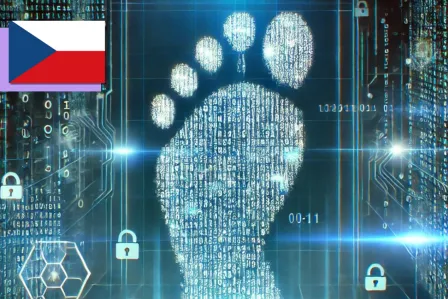The Czech SIC focuses on the importance of managing our digital footprint to protect privacy and security, offering practical tips for minimising risks and promoting digital literacy.

In today's digital age, each of us leaves behind a digital footprint – data and information that can be used in various ways. This very topic has become the main theme of the 2025 Safer Internet Day and Month campaign (#SID2025).
While our digital footprint enables access to personalized services and content, it also poses risks to our privacy and security. So how can we protect our digital identity and minimise the risk of misuse?
What is a digital footprint?
A digital footprint includes all the information and data we leave behind on the internet – from social media posts and online purchases to search queries, cookies, and IP addresses. This data can be tracked and used by third parties for marketing, user behaviour analysis, geopolitical influence, or even cyberattacks.
How to minimize the risks of a digital footprint?
Cybersecurity, prevention, and appropriate online self-defence are fundamental. Key measures include:
- Using strong passwords and two-factor authentication – to prevent unauthorised access to accounts.
- Setting privacy controls on social networks – defining who can see your posts and what information about you is available.
- Regularly deleting browser history and cookies – to reduce tracking of your online behaviour.
- Using a VPN – to enhance connection anonymity and protect your IP address.
- Being cautious when sharing personal data – information posted online can be difficult to remove.
- Managing online accounts – deleting inactive accounts that could be exploited by hackers.
Digital and media literacy and well-being
Enhancing digital literacy is key to a safer internet. Prevention, education, and awareness should be integral parts of our online existence. Learning how to protect personal data, recognise cyber threats, and navigate the digital space safely should be second nature.
The digital world brings many advantages but also new challenges. Every trace we leave on the internet can have long-term consequences. Therefore, let’s be cautious, educate ourselves, and work together to build a safer online environment.
Prevention pays off! It is more effective and financially less demanding than dealing with the consequences of cyber incidents.
Find more information about the work of the Czechish Safer Internet Centre, including its awareness raising, helpline, hotline, and youth participation services, or find similar information for other Safer Internet Centres throughout Europe.
The Czech SIC focuses on the importance of managing our digital footprint to protect privacy and security, offering practical tips for minimising risks and promoting digital literacy.

In today's digital age, each of us leaves behind a digital footprint – data and information that can be used in various ways. This very topic has become the main theme of the 2025 Safer Internet Day and Month campaign (#SID2025).
While our digital footprint enables access to personalized services and content, it also poses risks to our privacy and security. So how can we protect our digital identity and minimise the risk of misuse?
What is a digital footprint?
A digital footprint includes all the information and data we leave behind on the internet – from social media posts and online purchases to search queries, cookies, and IP addresses. This data can be tracked and used by third parties for marketing, user behaviour analysis, geopolitical influence, or even cyberattacks.
How to minimize the risks of a digital footprint?
Cybersecurity, prevention, and appropriate online self-defence are fundamental. Key measures include:
- Using strong passwords and two-factor authentication – to prevent unauthorised access to accounts.
- Setting privacy controls on social networks – defining who can see your posts and what information about you is available.
- Regularly deleting browser history and cookies – to reduce tracking of your online behaviour.
- Using a VPN – to enhance connection anonymity and protect your IP address.
- Being cautious when sharing personal data – information posted online can be difficult to remove.
- Managing online accounts – deleting inactive accounts that could be exploited by hackers.
Digital and media literacy and well-being
Enhancing digital literacy is key to a safer internet. Prevention, education, and awareness should be integral parts of our online existence. Learning how to protect personal data, recognise cyber threats, and navigate the digital space safely should be second nature.
The digital world brings many advantages but also new challenges. Every trace we leave on the internet can have long-term consequences. Therefore, let’s be cautious, educate ourselves, and work together to build a safer online environment.
Prevention pays off! It is more effective and financially less demanding than dealing with the consequences of cyber incidents.
Find more information about the work of the Czechish Safer Internet Centre, including its awareness raising, helpline, hotline, and youth participation services, or find similar information for other Safer Internet Centres throughout Europe.
- cybersecurity digital footprint online privacy digital well-being digital literacy
Related content
- < Previous article
- Next article >












